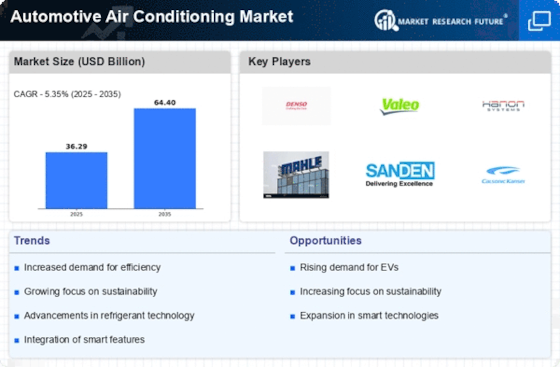Top Industry Leaders in the Automotive Air Conditioning Market
The automotive air conditioning (AC) sector resonates with a consistent buzz, propelled by escalating vehicle demand and an unwavering pursuit of driver comfort. However, beneath the soothing breeze lies a dynamic and multifaceted landscape, populated by both established giants and nimble innovators vying fiercely for market share. Navigating this industry successfully requires an understanding of the competitive strategies, key trends, and evolving factors shaping this complex terrain.
Established Players: Leveraging Experience and Scale
In this competitive arena, global industry giants such as Denso, Calsonic Kansei, Hanon Systems, and Valeo assert their dominance by capitalizing on extensive experience, robust supply chains, and dominant positions in original equipment manufacturer (OEM) partnerships. Operational efficiency, cost optimization, and incremental innovation in existing technologies are at the forefront of their strategies. Denso, for example, concentrates on enhancing compressor efficiency and refrigerant systems, while Calsonic Kansei places emphasis on lightweight materials and modular designs. Their commitment to core competencies and established relationships allows these giants to maintain a strong foothold in the mid-range and premium vehicle segments.
Emerging Contenders: Disrupting with Niche Expertise and Agility
Challenging the established order are smaller, emerging players armed with niche expertise and technological agility. Companies like DelStar Technologies and Engineered Plastic Components specialize in specific components, offering cost-effective alternatives to OEM systems. Others, like Marelli, focus on cutting-edge technologies such as cabin air purification and smart climate control systems, aligning with the growing consumer demand for health and comfort. By capitalizing on specific technological advancements and addressing unmet needs, these emerging players carve out distinct market niches, disrupting traditional business models.
Market Share Analysis: A Multifaceted Puzzle
Analyzing market share in the automotive AC sector necessitates a nuanced approach, considering factors beyond mere sales volume. Geographical distribution, vehicle segment penetration, aftermarket presence, and technological leadership all play pivotal roles. Asian players like Hanon Systems dominate the Asia-Pacific market due to strong OEM partnerships, while European giants like Valeo command a significant share in the luxury car segment. Additionally, aftermarket expertise through brands like Denso's densodirect allows players to capture additional market share beyond OEM supply. Therefore, a comprehensive understanding of these multifaceted factors is essential for accurately assessing a player's competitive positioning.
New and Emerging Trends: Shaking the Iceberg
The automotive AC market is in a constant state of evolution, with several key trends impacting the competitive landscape. The rise of electric vehicles (EVs) poses both challenges and opportunities. While EVs necessitate different cooling systems due to battery thermal management needs, they also create avenues for innovation in energy-efficient and eco-friendly solutions. Companies like Hanon Systems are developing heat pump AC systems for EVs, utilizing waste heat from batteries for cabin cooling, thereby reducing energy consumption.
Moreover, the increasing customer focus on health and well-being is driving demand for advanced air filtration and air quality management systems. Companies like Marelli, as previously mentioned, are capitalizing on this trend with their Indoor Air Quality (IAQ) purification systems. Additionally, the integration of AC systems with connected car technologies and voice-activated controls is gaining traction, compelling players to invest in smart systems and data analytics capabilities.
Overall Competitive Scenario: A Balancing Act
Success in this dynamic landscape depends on the ability to adapt to evolving trends and cater to diverse customer needs. While established players leverage their vast experience and scale, smaller companies can capitalize on niche expertise, technological agility, and responsiveness to new market demands. Ultimately, companies that strike the right balance between core competencies, innovative solutions, and market adaptability will thrive in this ever-chilling competitive environment.
Industry Developments and Latest Updates:
Denso Corporation:
-
Date: December 21, 2023 -
Source: Denso Press Release -
Development: Denso announces the mass production of CO2 refrigerant air conditioners for commercial vehicles in Europe. This technology boasts a lower environmental impact compared to traditional HFC refrigerants.
Hanon Systems:
-
Date: December 28, 2023 -
Source: The Korean Herald -
Development: Hanon Systems partners with LG Electronics to develop next-generation in-vehicle air purification systems that remove ultrafine dust and harmful gases.
Mitsubishi Heavy Industries Ltd.:
-
Date: November 15, 2023 -
Source: Nikkei Asia -
Development: Mitsubishi Heavy Industries collaborates with a Japanese startup to develop air conditioning systems that utilize waste heat from electric vehicle batteries, improving energy efficiency.
Valeo SA:
-
Date: December 05, 2023 -
Source: Valeo website -
Development: Valeo introduces a new line of high-efficiency compressors for hybrid and electric vehicles, reducing energy consumption and extending the driving range.
Keihin Corporation:
-
Date: October 26, 2023 -
Source: Keihin website -
Development: Keihin develops a compact and lightweight electric compressor for automotive air conditioning systems, ideal for space-constrained vehicles.
Top Companies in the Automotive Air Conditioning Industry include:
- Denso Corporation
- Hanon Systems
- Mitsubishi Heavy Industries Ltd.
- MAHLE GmbH
- Valeo SA
- Keihin Corporation
- Calsonic Kansei Corporation
- Samvardhana Motherson Group
- Subros Limited
- SMAC Auto Air, and others.










